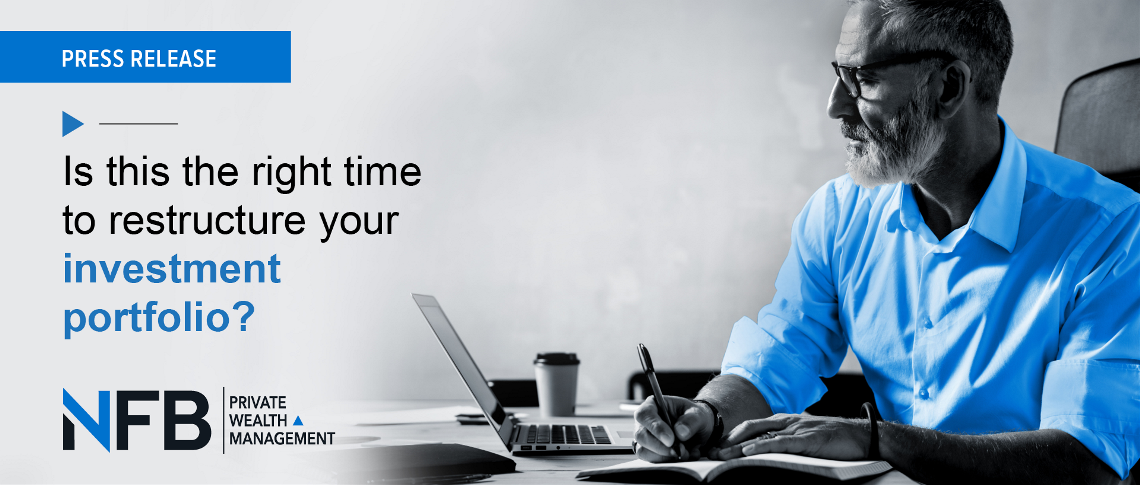Is This the Right Time to Restructure Your Investment Portfolio?
Three questions to ask before restructuring your investment portfolio during uncertain times.


The COVID-19 pandemic has had far reaching economic consequences for businesses around the world. The economic shockwaves have seen many small and medium sized businesses close their doors while unemployment figures continue to skyrocket. By all accounts the fallout will be deteriorating further before there are green shoots apparent.
At the same time there have been calls on government to allow individuals with retirement savings to access these savings early as a relief measure given the high number of people who have seen their income dry up in recent months. Government have responded, having consulted with various stakeholders, including the regulator. Temporary changes have been made, both allowing for slightly reduced drawings which would allow portfolios to recover, and also increased drawings to help those who need to supplement incomes.
While it may be very tempting to dip into retirement savings given the fact that many individuals are under financial strain currently, the danger is that it crystallises any market losses. Take for example a share that was priced at R1 earlier this year and is now priced at R0.70. Selling at the lower price means there is no way of recouping your losses.
1. Should I dip into my retirement savings?
The problem with dipping into retirement savings is that it’s a short-term solution only. It reminds me a bit of the fable of the little Dutch boy who put his finger in a leaking dike to save a town. The reality, however, is that in the same way that a finger won’t preserve a leaking dike, neither will dipping into retirement savings solve the longer term problem of funding retirement.
A far more likely scenario is that as individuals get used to bigger drawdowns to fund their lifestyle, they embark on a route from which they can’t depart.
The inconvenient truth is that it is not a wealth manager’s job to try and create money for a client, but rather to invest the available funds appropriately and wisely. My advice therefore, both for those who are already in retirement or are currently not able to earn an income is to cut your cloth, or, in other words, act within your financial limitations.
2. What should I look out for?
The big danger in the current environment is that less financially astute individuals may well be vulnerable to financial scams, which are likely to be on the rise in the weeks and months ahead. For those looking to invest in ventures promising lucrative returns the best advice I can give you is to be super vigilant and overly cautious. A property venture promising a 12% return, for example, is likely to be too good to be true. Good returns are going to be scarce in the months ahead so make sure you don’t hemorrhage cash.
The reality is that we are in uncharted territory right now. Emerging market economies are in a particularly vulnerable situation. In South Africa, a number of what we have traditionally considered to be growth assets have been severely compromised recently. Retail property funds across the board are struggling given that many large retailers are currently in conversation with their landlords to reduce their rent. The question becomes: Is it time to run for the hills as far as retail property funds are concerned or will they ultimately make a comeback? The tourism industry has been the worst hit. The rand is at near record lows and is expected to be volatile for some time to come. Of critical importance is what has happened has occurred before. This time is not different. It feels so because of the unique Covid environment. Investments, provided they are of high quality go through down cycles. This one has been very dramatic. However, following down cycles, come recoveries. This is evident already.
3. What should I consider when purchasing stock?
The trick right now is to consider using investments which utilise tax efficiently and manage capital gains cleverly. When considering investments, don’t look at pure value only. Given the potential for a corporate debt crisis, investors will need to delve more deeply before making a decision about which stocks to purchase.
While technology stocks have traditionally been part of a diversified portfolio it’s important to invest in defensible tech stock. What this means is that the company’s products or services should not be easily replaced by a potential competitor. Look for stocks with low debt levels and high margins. If you can, consult professional advisors. They need to earn their keep!
Closing thoughts
Don’t try to time the market. The correction is potentially not over yet and there is a strong likelihood that you will miss the opportunity. Instead, rather rely on a portfolio manager or financial advisor to find companies to invest in that are future proof and that are dividend aristocrats (companies that have increased their dividend pay-outs over many consecutive years). These companies are more likely to continue to pay dividends – even if they are lower in the short term.
At NFB, we help our clients establish and maximise their portfolios both locally and globally with a range of strategies and products that can be tailored to meet their personal, business and lifestyle requirements. Contact one of our Independent Private Wealth Managers today.













